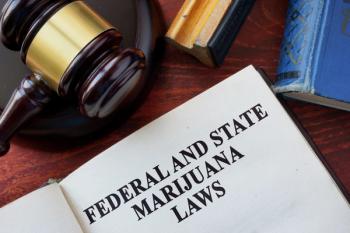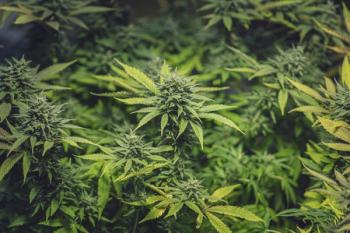
Episode 7: Cannabis Series: FDA Support, Research in the Works
Our first episode of our latest Cannabis Series is focused on the burgeoning medical marijuana landscape, featuring FDA's guidelines and research on the diverse benefits of cannabis as medicine.
Hello! I’m Gab Ientile, and this is Over the Counter, the podcast from Drug Topics®.
Welcome to the first episode of our latest Cannabis Series, focusing on the burgeoning medical marijuana landscape and featuring experts devoted to fostering research on the diverse benefits of cannabis as medicine.
Definitive data on cannabis, the compounds found in cannabis, and their effects on the endocannabinoid system, is currently a bit of a lunar landscape. Recently though, the FDA has expressed its commitment to supporting medical cannabis and cannabis-compound research.
Cannabis, the plant, contains more than 80 biologically active chemical compounds, called cannabinoids. Two of the most popular cannabinoids are CBD and THC.
While there is a multitude of products currently on the market touting CBD as an ingredient and the benefits it can bring, these products - including oil drops, capsules, syrups, food products such as chocolate bars and tea, cosmetics, topical lotions and creams, have not been evaluated by the FDA for safety and efficacy. There’s only 1 prescription drug containing CBD that has been approved. It treats 2 rare and severe pediatric epilepsy disorders.
In 2018, Congress passed the Farm Bill, which differentiated hemp from other cannabis plants, all of which had been illegal under the Controlled Substances Act. With the passing of the Farm Bill, hemp could be cultivated, with the necessary licenses, if it contained no more than .3% of THC.
Lombardo: My name is Jeff Lombardo. I'm a research assistant professor at the University of Buffalo center for integrated global biomedical sciences here in Buffalo, New York. One of the things that we have done at the university is developed a cannabinoid research program, looking at preclinical and clinical models and cannabinoids for various indications.
Dr. Lombardo is encouraged by the FDA’s pledge to facilitate clinical research on cannabis.
On July 21, 2020, the FDA released a draft guidance for cannabis-related clinical research in response to considerable interest by stakeholders in developing drugs containing cannabis and cannabis compounds. The guidance document provides industry stakeholders with practical recommendations regarding cannabis sources for research, quality consideration, and calculating THC levels in prospective drug products.
Lombardo: There's promise for these agents for certain indications: for pain, for multiple sclerosis, cachexia, there are therapeutic benefits, which I think are real. I'm an oncology pharmacist by training. We have natural products that we use. I remember back in the 90s when Paclitaxel was first being investigated, and that came from a natural product like alkaloids. So for me it's not much of a far-fetch that natural products, botanicals, plant-based medications, can be therapeutically beneficial, they just need to go through the same process.
So I think what this document is and it's focused more on, I would say, the application process, standards, policy procedure, manufacturing, what you need to validate your compound and follow the guidelines.
I think the second part, which really isn’t reflected in this document, is the clinical portion. That to me, I think is the easy part. Because if there is a reschedule, or if there is an academic institution that traditionally have run the clinical trials, and if it doesn't jeopardize maybe some other NIH funding or federal grants, they really have the expertise to run the clinical aspect of the trials.
And I think this is really directed to sponsors and manufacturers if they have a vertical seed to sale type of product and production – it gives them a guidance. You know, I think over the past couple years, many, many, many companies have moved into the CBD space. There's a wide variation of standards, quality controls and ultimately finished products that are marketed. And I think documents like this and a roadmap and really a guidance document will separate those in the marketplace that are legitimate and can hold up to eventually go into the next step if they choose to do so.
Dr. Lombardo is one of the principal investigators on a study that began on July 27, 2020, which was designed with significant input from the FDA. Several leading CBD brands - Boulder Botanical & Bioscience labs, CBDistillery, CBD American Shaman, Charlotte’s Web, Columbia Care, HempFusion, and Kannaway – are participating in an industry-wide study measuring the effects that full spectrum hemp derived CBD and CBD isolates have on the liver.
Lombardo: This study is looking at liver toxicity with hemp-based products that are in the marketplace. I guess the genesis of this research activity came off of a really an advisory letter that came out from Dr. Abernathy from the FDA. Looking at potential liver toxicities with some CBD containing products.
A company called Valid Care, which is acting as a data aggregator and a CRO, solicited manufacturers and sponsors in the marketplace that have full spectrum hemp extracts.
One of the concerns with using some of these products and has been seen in the data with the Epidiolex FDA submission and prescription medication is at high doses, there could be a chance of liver toxicity. They were concerned from a safety aspect, the FDA, that these products, whether they're sold as nutraceuticals or as dietary supplements, that are in the marketplace and what are the effects in consumers?
We are launching the study today, so the timing is very good. We have 10 companies that have stepped up and are going to use their products for testing. The kind of the design of the study is, part of the inclusion criteria and for enrollment, is for patients to be on a hemp-based product for at least 30 days. They will be enrolled in this study and continue on the product for another 30 days. At the end of a minimum of 60 days of taking products, we will do a CMP metabolic panel and we'll look at liver function tests to see if there is an elevation in liver enzymes. We'll be looking at other biomarkers in that study, and that is being done.
The PIs are Dr. Keith Aqua, a physician, and myself running that study. And then we have our statistician and Dr. Robert Kaufman, who is our medical director, overseeing the protocol and also part of this study.
The interesting thing is that the 10 companies will be helping with enrollment, and during the 30 day period, when they're on, we'll be getting complete medical records, we'll be getting a complete medication profile, we'll be getting a utilization of products. So some of these patients, I would say that they're going to be on it for maybe 6 months, maybe even longer. And I think what we're going to get out of this is real-world evidence of what may be occurring in individuals that are taking the product for a short period of time 30 to 60 days, and individuals that may be taking the products for years. It'll be very interesting to see, and we should have some data and results that we can look at and eventually publish I would say by the end of the year.
Dr. Lombardo also explained that there’s a lot of variety in the availability of medical cannabis products state-by-state.
Lombardo: I can speak specifically for the cannabis products in New York State. We have a medical marijuana program for various indications in New York state that allows a patient to go to dispensary and pick up a product.
The companies, there are 10 New York State, it's a seed to sale program where they grow, process and sell all within the organization. There's an independent third-party lab in Albany that any product that is sold in the marketplace needs to go there for testing to get a certificate of analysis. They look at pesticides, they look at fungal growth and really quality control standards. And what's actually in the bottle is on the label.
They sell the products, which they call a 1-to-1 THC to CBD ratio, so equal amounts of THC and CBD. They may have a high to low ratio or a low to high meaning you have high THC, low CBD or high CBD, low THC.
Patients come in with a recommendation from the physician and the physician could give an open recommendation as far as what dosage form a patient can be given or leave it up to the pharmacist to choose. The single dose that a patient can receive in New York State at 1 time as a maximum of 10 milligrams of THC and then the frequency whether you take it 2 or 3 or four 4 a day is usually predicated on the pharmacokinetics or the product.
In NY state there are vapors, vaporizers, you have tinctures or oils, or you have capsules or some tablets. Other states are different as far as what they can offer. Some states have combination of edibles, dry flour along with some of the products I just explained or said that we have in New York State.
There's a lot of variation a lot of fluctuation, and other states might not have a pharmacist at the dispensary looking at what are the medications are you on and recommendations and how to follow up with patients. So it's a little bit of the Wild West. But I can tell you, once again, I work with oncology patients that patients do get relief.
And I think what's really important is that dispensary pharmacy, number 1, provide education to the patient. And number 2 is provide some type of feedback mechanism to the prescriber that connects the dispensary to the patient to the physician. Once again, there's a lot of emphasis about choosing a product, you know, making that initial sale, but that's really only the first part of the equation. The second part is you need a plan in place, how to reach out to the patient when they start therapy in a week, 2 weeks, 2 months, whatever that may be, to see number 1, that it's safe, there's no adverse offense. Number 2, if they're going to be taking the medication, what's the optimal dose, because a lot of times they're taking this in conjunction with conventional pharmaceuticals for various indications.
Here are the main takeaways from this episode:
- There are a lot of CBD and hemp products on the market, but they are not FDA approved, due to the fact that there’s still a lot to learn about the safety and efficacy of cannabis and cannabis-derived compounds.
- The FDA is encouraging cannabis and cannabis compound clinical research, most recently with their release on draft guidelines made to offer recommendations on sources for research, quality consideration, and calculating THC levels in prospective drug products.
- The FDA provided significant input in the design of the observational study that Dr. Lombardo is currently working on, which aims to provide the agency with research that will help develop the appropriate regulatory pathways for hemp derived CBD products.
If you enjoyed this episode, make sure to subscribe where you listen to podcasts. And check out DrugTopics.com for more content on CBD and medical cannabis, as well as the latest news on the most pressing pharmacy issues.
Thanks for listening, and we hope to see you next time at the counter.
Newsletter
Pharmacy practice is always changing. Stay ahead of the curve with the Drug Topics newsletter and get the latest drug information, industry trends, and patient care tips.























